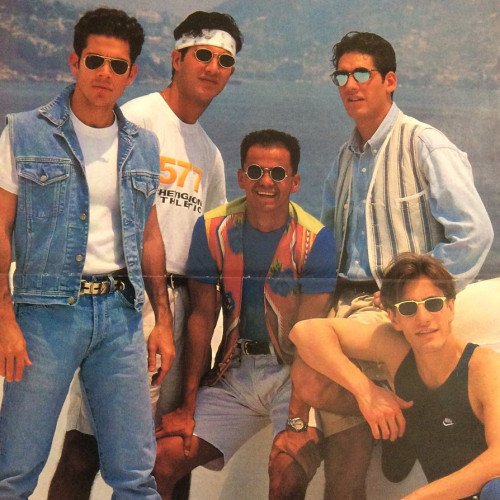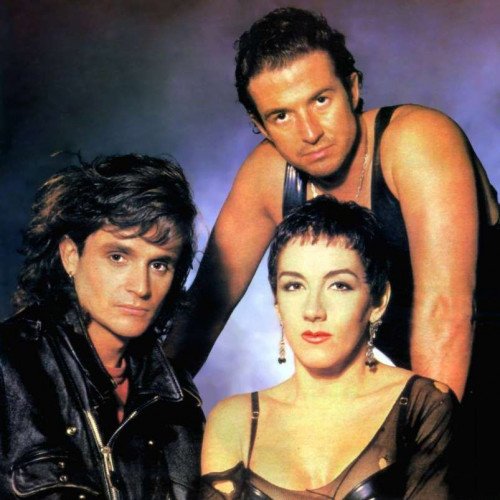Best latin pop group

Magneto
Magneto was a popular Mexican boy band of the 1980s and 1990s. The band formed on February 14, 1983.[2] In 1986, Magneto was featured in "Siempre en Domingo," a Mexican entertainment show viewed across Latin America and parts of Europe. Mexican teen pop group Magneto emerged in 1983. Their first record, Dejalo Que Gire came in 1984, followed by Super 6 Magneto. The Latin pop outfit suffered several lineup changes before achieving their first gold record in 1986. Mostly playing dance-pop songs, the five-member ensemble started touring Central America after climbing charts with "Todo Esta Muy Bien," and "Soy Un Soñador." However, their breakthrough came after issuing a Spanish-language version of Desireless' "Voyage, voyage," a French pop hit from the '80s. In 1992 the boy band played the lead in their own movie, Cambiando el Destino. Magneto won the Lo Nuestro Award for Pop New Artist of the Year, and received two nominations for the Lo Nuestro Awards of 1993: Pop Album (Magneto) and Pop Group of the Year.[3] Nevertheless, the original Magneto disbanded in 1996 after a sold-out show at Mexico City's Auditorio Nacional. A number of former Magneto members (the group's 1993-1996 lineup of Alan Ibarra, Mauri Stern, Elias Cervantes, Toño Beltraneña, and Hugo de la Barreda, better known as Alex) reunited in 2009. In 2016, Magneto toured with Mercurio, a 1990s Mexican boy band. In 2017, they toured with Sentidos Opuestos, Mercurio and Kabah as part of the Únete a la fiesta concert series of 1990s pop music nostalgia. Original members Francisco Mtz. Frank (Pepe Ovadia) Diego Alfaro Iñaki Huacuja Enrique Oyanguren Jose Javier Iñiguez Mario Zainos (1989) Later members Jose Antonio Chapa Emiliano Balderas Juan Botella Mauricio Rocha Santiago Antón Mauri Stern (Marcos Stern Chernovetzky) Mario Zainos Alan (Erick Ibarra Miramontes) Antonio (Tono) Beltranena Paolo Mattos (vocalist) Carlos Martinez Gonzales (Charlie)
Statistics for this Xoptio

Mecano
Mecano was a Spanish pop band formed in 1981 and active until 1992. Mecano became one of the most successful Spanish pop bands of all time. The band is still the best-selling Spanish band, with over 25 million records worldwide.[1] They were considered by some to be avant-garde for their time[2] and part of la Movida Madrileña countercultural movement. They had a brief comeback in 1998. The band's line-up was singer Ana Torroja and brothers Nacho and José María Cano, who worked alongside session musicians such as Arturo Terriza, Manolo Aguilar, Nacho Mañó, Javier Quílez, Ángel Celada and Óscar Astruga. The trio's musical career spanned two distinct stages. The first, up to 1985, was essentially as a synthpop band, while in the second stage Mecano followed a more acoustic pop rock direction, with elements of ballad, dance, flamenco, bossa nova, tango, salsa, rumba flamenca, bolero, pasodoble, and even reggae. The unprecedented success also hit Hispanic America. Also, thanks to adaptations to other languages of several of their songs, they influenced non-Spanish speaking countries such as Italy and France, as with their Une femme avec une femme. This foreign song still holds the record for most weeks spent at the top of the French charts. In 2005, Mecano's music was adapted into the successful musical Hoy no me puedo levantar, which opened productions in Spain and Mexico. After two years, it was announced that the musical had been seen by more than 1,500,000 spectators in both countries, making it the most successful original production in Spanish of all times. Some of their biggest number one singles include "Me cuesta tanto olvidarte", "La fuerza del destino", "Hijo de la luna", "Cruz de navajas", "Une femme avec une femme" ("Mujer contra mujer", a worldwide number one hit), and "El 7 de septiembre".